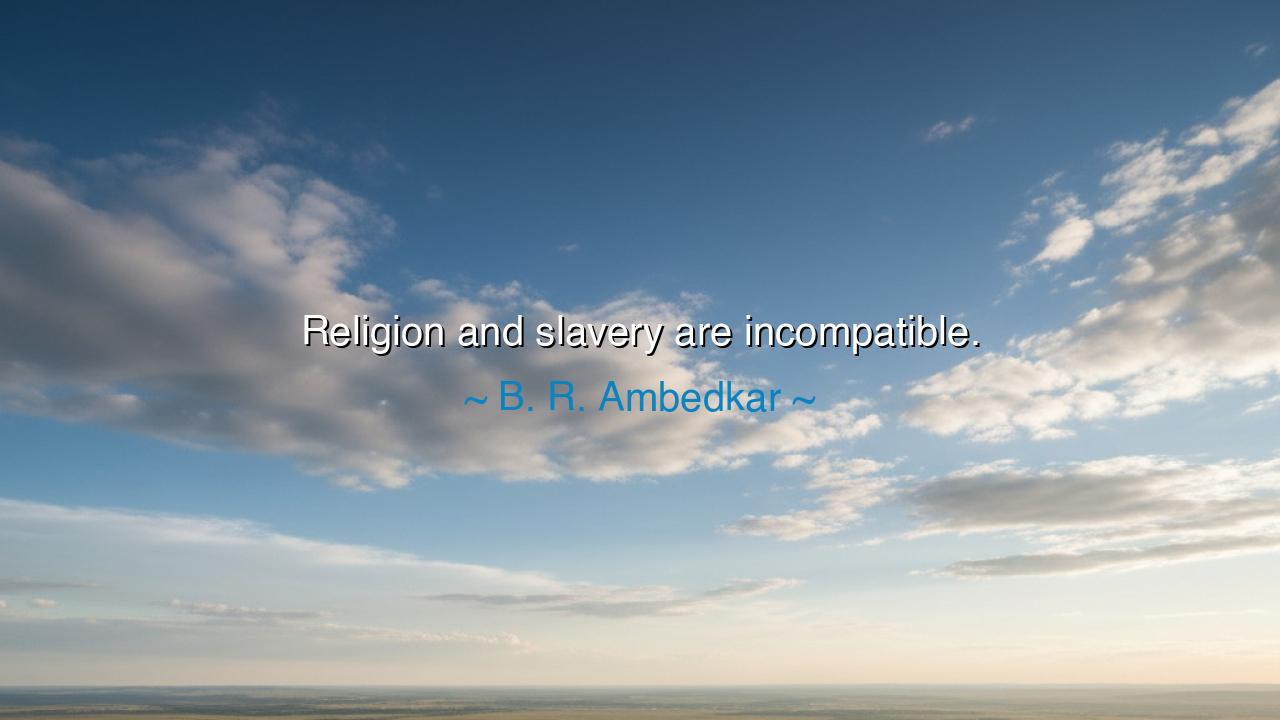
Religion and slavery are incompatible.






Hear now, O seekers of truth, the bold words of B. R. Ambedkar, who spoke with the fire of one who understands the deepest injustices of the human condition: "Religion and slavery are incompatible." These words strike at the very heart of the relationship between faith and freedom—a relationship that has been the foundation of much of human struggle. Ambedkar’s proclamation is a call to recognize that true religion cannot coexist with the shackles of oppression. For how can a soul that is bound in slavery ever truly experience the freedom of spiritual enlightenment? How can one who is denied their dignity and rights ever find peace in a faith that calls them to love and justice?
In ancient times, the philosophers and prophets of the world understood the importance of freedom in the pursuit of truth. Socrates knew that the soul could not flourish under the rule of tyranny, for reason and justice were always bound to the freedom of the mind. The Hebrews, too, understood this in their struggle for freedom from Egyptian bondage, where their deliverance from slavery was not just a physical escape, but a spiritual rebirth. The Exodus story is not merely the tale of a people freed from the physical chains of slavery, but a spiritual journey where justice, freedom, and faith became inseparable. In their covenant with God, the Hebrews were not just promised a land but a dignity—the very essence of human worth.
Similarly, the ancient Greeks believed that freedom was necessary for the soul to achieve its highest potential. Plato spoke of the just man as one who was free from the chains of tyranny and oppression, able to pursue a life of virtue and wisdom. To live in slavery, whether to an unjust ruler or to the weight of societal constraints, was to live in a state of falsehood, where the true nature of the soul could not be realized. Ambedkar was acutely aware of this when he challenged the deep entrenched systems of caste and oppression in India, understanding that the denial of freedom to any human being was a betrayal of the very principles that all religions claim to uphold.
Consider the struggles of freedom fighters throughout history, from Mahatma Gandhi to Frederick Douglass, who fought not only for physical freedom but for the dignity of the soul. Gandhi, in his fight for Indian independence, understood that slavery, whether imposed by a foreign power or by an unjust caste system, was not just a physical state but a spiritual one. To be bound in any form of oppression is to live in a state of spiritual poverty, where the soul is denied the freedom to express its fullest potential. Similarly, Frederick Douglass, born into slavery, fought not just for freedom from his chains but for the liberation of his very spirit, understanding that slavery and faith could never coexist in the heart of a truly free man.
Ambedkar’s words are a clarion call to examine the incompatibility of oppression with the sacred. Religion, in its purest form, is a call to recognize the divine within every human being. It teaches us to love, to serve, and to fight for justice, not just for the few, but for all. But how can such a religion exist in a society that enslaves others, that denies them their dignity and humanity? Ambedkar’s own life was a testimony to this struggle, as he, born into the lowest caste of India, faced relentless social and religious oppression. Yet, through his wisdom and resolve, he fought to create a society where all could be free, where faith could flourish not as a tool of control but as a means of empowerment.
The lesson of Ambedkar’s words is clear: true freedom cannot exist in the presence of slavery, whether physical, mental, or spiritual. To be enslaved is to be deprived not only of liberty but of humanity. Religion that seeks to bind its followers in oppression is not the true religion of justice and compassion. Therefore, let us take heed, O seekers, and recognize that any system that perpetuates slavery—whether through caste, race, or class—must be rejected as incompatible with the spiritual ideals we hold dear. True faith calls us to freedom, to dignity, and to the recognition of the divine in every human being, for only in freedom can the soul truly find its path to the divine.
So, let us act, O seekers, to build a world where no man is enslaved by injustice, where faith and freedom are intertwined, and where the dignity of every soul is respected. In this, we will honor the true teachings of all religions, those that call us to live in the light of justice, compassion, and equality. Let us walk forward, together, into a future where the chains of slavery are broken and the spirit of every person is free to soar.






AAdministratorAdministrator
Welcome, honored guests. Please leave a comment, we will respond soon